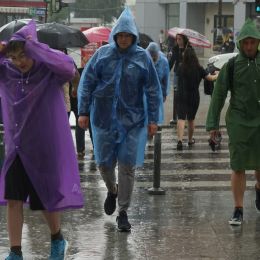The austerity measures announced by president Traian Basescu are as drastic and unpopular as they are compelling to support the future development of the Romanian economy, economists say, adding that these measures should have been enforced earlier.
“Any measure to cut state spending would have been cruel and unpopular. But the austerity of these measures is even greater given the Government’s failure to take a corrective approach in times of economic boom. Just waiting out the storm would have only worsened the country’s long-term situation”, said Lucian Anghel (photo), senior economist Banca Comerciala Romana.
Under IMF pressure, the government had to choose between raising income tax from 16% to 20% and the VAT from 19% to 25% and a drastic cut in state expenditures. Traian Basescu choose the latter, calling it the “reliable variant”, accepted in the end by the IMF officials.
“However, these measures may not be sufficient, but are very useful to restore the economic growth as soon as possible”, said Nicolae Chidesciuc, senior economist ING Bank Romania.
Expenditure cuts are much better than raising taxes, in terms of medium to long-term economic activity prospects.
“One of the options was the no-confidence variant which would involve an increase in VAT from 19% to 24%, of income tax from 16% to 20% and 20% cut in wages, to meet a 6-8% deficit target. But the second option was the reliable one that will allow the Government stick to the broader expenditures restructuring plans”, Traian Basescu said Thursday.
Under these circumstances, the increase in labor productivity remains one of the few alternatives Romanian economy has to remain an investor-friendly country.
“The solution is to constantly improve labor productivity, in order to keep the economy attractive for investors. If these measures will help the Government keep the budget gap within the target range agreed with the International Monetary Fund, the country risk and investors’ outlook will improve”, said Rozalia Pal, UniCredit Tiriac Bank senior economist said.
The Gov’t would have saved 4.6 bn lei if it had cut spending from January 1
Romania’s budget gap stood at 1.5% of Gross Domestic Product in the first quarter this year, or 8.22 billion lei, narrowly below the 8.25 billion lei cap set by the IMF.
State expenditures stood at 45.75 billion lei in the first quarter 2010, but would have been 4.61 billion lei, if the government had cut public sector payroll by 25%, pensions and social benefits by 15% at the beginning of the year.
But even if revenues from income tax, and unemployment and social insurance contributions had been smaller, the budget deficit would still have been lower.

A 25% cut in state sector payroll in the first quarter 2010 would have saved around 2.92 billion lei.
The largest portion of the state budget goes towards social security and the second largest to payroll.
The state spent 10.54 billion lei from social insurances budget (the largest share of these funds go to retirement benefits) and 751 million lei from jobless benefits budget. Subtracting 15% from these amounts would result in a 1.69 billion lei saving.
“A tax hike would directly hurt production with the private sector taking the brunt of these pressures, and put the economic recovery on a shaky ground. Furthermore, the state has to efficiently manage public finances so as to steer them towards key investment sectors”, said Rozalia Pal (photo).
In the current conditions, a tax hike would have wrecked the Romanian economy’s fragile recovery and lead to a double-dip recession in the private sector, that suffered a severe correction over the past 12 months anyway. But on the other hand, cutting retirement and unemployment benefits doesn’t seem like the optimal solution, given the low pensions in Romania, and the alarming growth of the jobless rate.
Citeste si:
Calculator Salariu: Află câți bani primești în mână în funcție de salariul brut »
Te-ar putea interesa și:



















































































![HR [PLAY] Tech Workout - 11...](https://www.wall-street.ro/image_thumbs/thumbs/973/973fe0a3888d417feff63de42e814180-260x260-00-65.jpg?v=1713489712)









